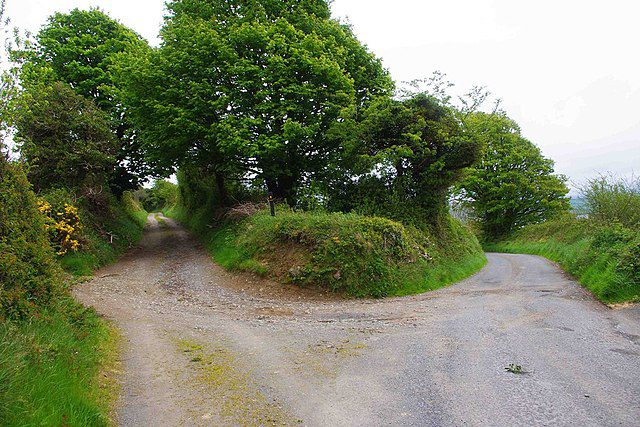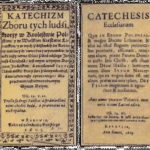
Ballylaghnan, Co. Clare
What follows is a Dharma talk delivered by Sensei Edward Sanshin Oberholtzer at the regular Saturday morning gathering of the Empty Moon Zen sangha on the 20th of April, 2024.
I’m sure that one of those gateway drugs that nudged me in the direction of Zen practice was a PBS series of Japanese films, introduced by Edward O. Reischower, and broadcast in the mid 1970’s on the Boston station, WGBH. It featured films by Ozu and Ichikawa, including that Buddhist classic, the Harp of Burma, and, of course, many of the films had been directed by Akira Kurasawa. His samurai films, The Seven Samurai, the Hidden Fortrous, Rashomon, Sanjuro and Yojimbo were a major draw. I was particularly taken by the characters played by Toshiro Mufuni. During the opening credits of Yojimbo, Mufuni is seen walking down a dusty trail to where the road splits. He contemplates this for a moment, reaches down, picks up a stick, tosses it in the air where it lands on one of the two paths. The samurai shrugs and saunters off in that direction and my mind saunters off to the couplet:
The Great Way is not difficult
For those who do not pick and choose
Sengcan, the legendary third Chinese patriarch of Zen, is credited with writing those words, the beginning of the poem we know as Trust in Mind, and he could have been speaking to Mufuni’s character in that moment. Buddhism, classic Indian Buddhism, gives us the eightfold path, a road map with steps and stations for those of us with an inclination to follow a map. The Great Way is more an invitation to a long and dusty road. Both have their sets of travellers, both are invitations to seekers of the Dharma.
Little is known of Sengcan. The enlightenment story told by our ancestor Keizan Jokin in his collection the Denko Roku seems a pale echo of the enlightenment story of Sengcan’s immediate ancestor Huike, substituting Sengcan’s leprosy for the severed arm of Huike and Sengcan’s sins for Huike’s mind, neither of which could be found, both of which are resolved by their very unknowability. Little else is known of Sengcan except for the poem Trust in Mind, a collection heavily influenced by Daoism and consisting of 146 lines arranged in couplets and urging us to, as the poem goes:
When pref’rences are cast aside the Way stands clear and undisguised.
But even slight distinctions made set earth and heaven far apart.
If you would clearly see the truth, discard opinions pro and con.
But it’s the words of that New York Yankees worthy Yogi Berra which provide, to my mind, perhaps the best and most succient summation of the poem, “When you come to a fork in the road, take it.” Words duly followed by Mufuni’s character.
Certainly, both Sengcan and Yogi Berra continued to speak through that grandmotherly Zen teacher Zhaozhou as we hear in the koan entitled Zhaozhou’s Country Bumpkin, case 57 in the Blue Cliff Record
A monk asked Zhaozhou, “‘The supreme way is not difficult; it simply dislikes choosing.’ What is non-choosing?”
Zhaozhou said, “‘Above the heavens, beneath the heavens, I am alone and the honored one.’”
“Isn’t that still choosing?” returned the monk, to which Zhaozhou said,
“You country bumpkin! Where is the choosing?” The monk said nothing.
A fork in the road, a stick tossed in the air, a weary samurai trudges down a country road alone towards an unknown and troubled village, and again, we hear from another curious monk in Case 58: Zhaozhou’s Non-Vindication
A monk asked Zhaozhou, “You say ‘The supreme way is not difficult; it simply dislikes choosing.’ Isn’t that a pit into which we’ve have fallen?”
Zhaozhou said, “Once someone asked me about that. For the five years since then, I haven’t been able to apologize for it.”
Koun Yamada once asked Anne Aitken what she thought of death. “When the bus stops, you get on-board”’ she said. Standing at a bus stop, hearing the hiss of the bus’s brakes, the sound of the door sliding open, the hooded bus driver offering with a soectral hand, not a ferry crossing of the river Styx but a simple, almost mundane ride off into eternity, the old women needs no thought, not even a stick tossed in the air. She simply boards the bus, pays her fare, and takes a seat. And there, on the side of that dusty road, the bus passes a dusty, grizzled samurai and a series of old Burma Shave signs on which appears yet another question from yet another monk in:
Case 59: Zhaozhou’s Simply the Way
A monk asked Zhaozhou, “‘The supreme way is not difficult; it simply dislikes choosing.’ If there are words at all, that is choosing. How then can you teach others?”
Zhaozhou said, “Why don’t you complete the quotation?”
“I just wish to know about this.”said the monk.
“Only this, ‘the supreme way is not difficult; it simply dislikes choosing.’” returned Zhaozhou
One wonders, does the samurai ever regret following the stick’s path down to that Japanese town riven with stife? Does Anne Aitken regret the bus’s destination? I think not. I think regret did not enter their minds. But here, traveling down that roadway, the bus passes first the samurai, then a an ancient, though more recent poet, perhaps a country bumpkin, though born in San Francisco, who, having set off down the road himself wonders about:
The Road Not Taken
By, of course, Robert Frost
Two roads diverged in a yellow wood,
And sorry I could not travel both
And be one traveler, long I stood
And looked down one as far as I could
To where it bent in the undergrowth;
Then took the other, as just as fair,
And having perhaps the better claim,
Because it was grassy and wanted wear;
Though as for that the passing there
Had worn them really about the same,
And both that morning equally lay
In leaves no step had trodden black.
Oh, I kept the first for another day!
Yet knowing how way leads on to way,
I doubted if I should ever come back.
I shall be telling this with a sigh
Somewhere ages and ages hence:
Two roads diverged in a wood, and I—
I took the one less traveled by,
And that has made all the difference.
A good choice, perhaps, but a choice nonetheless.
Frost may not be alone, for as the poet Kobayashi Issa wrote:
This world of dew
is just this world of dew-
and yet……
and yet……
Choices made or not made, we step onto the dusty path and place one foot in front of the other. Sengcan encourages us on our way. That grizzled samurai turns and gazes us as we travel, Anne Aitchen waves from her bus as she passes, Zhaozhou, ever the grandmother, finishes with “The supreme way is not difficult; it simply dislikes choosing.”













